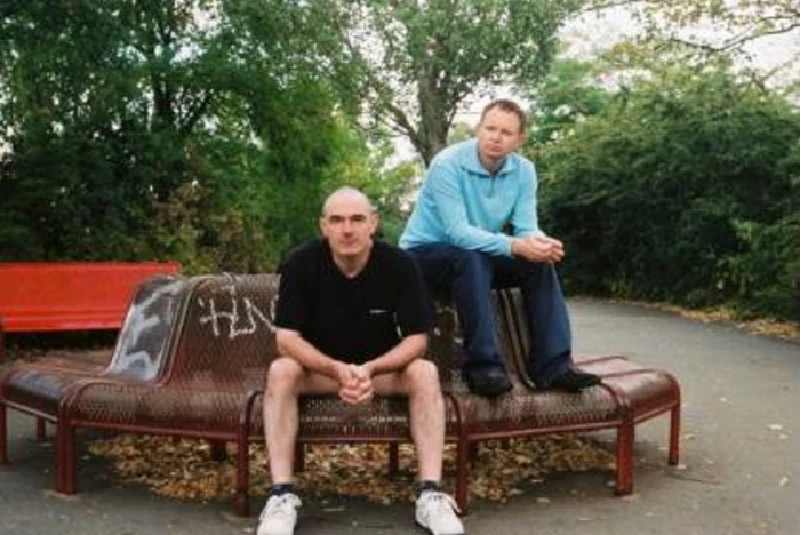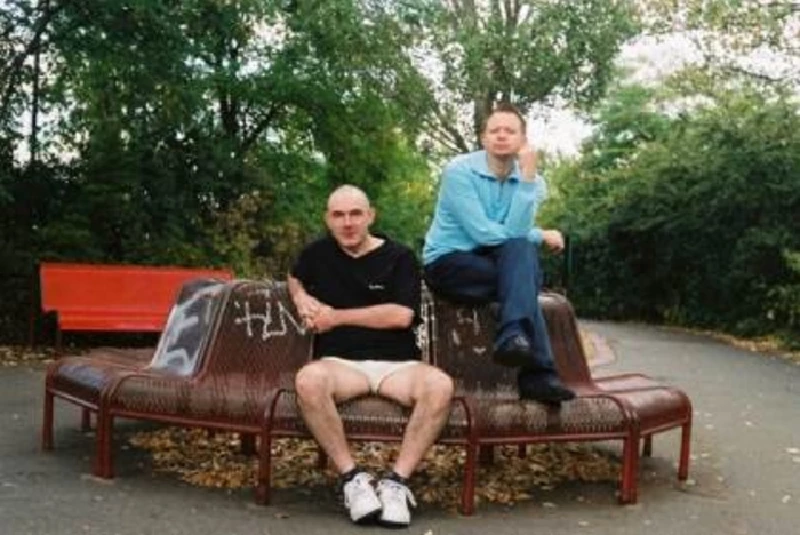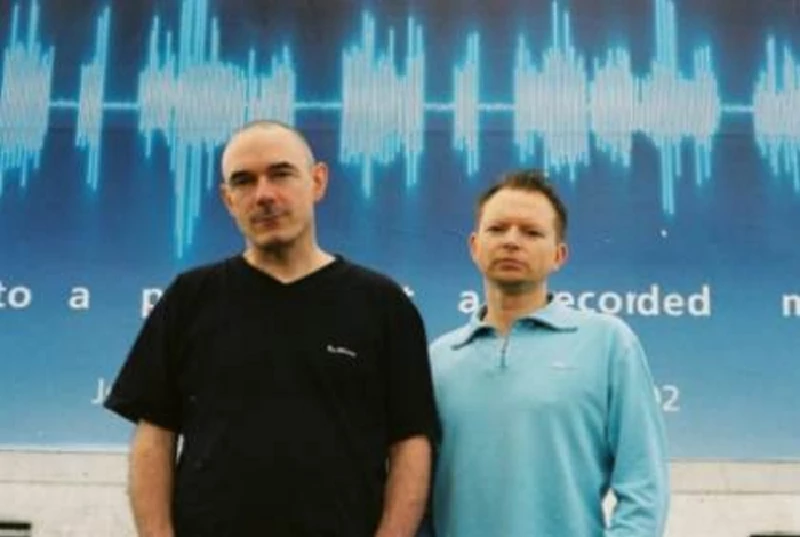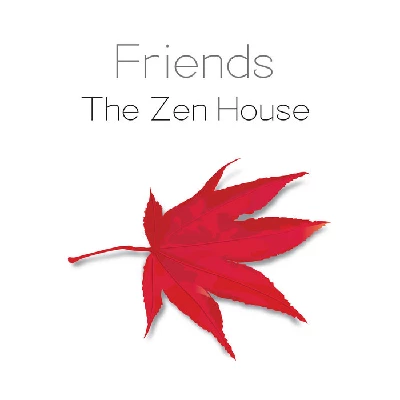Friends - Interview
by Sarah Rowland
published: 23 / 11 / 2007

intro
In our third interview with them, Sarah Johnson speaks to William Jones from durable indie pop group Friends about the band's just released ninth album, 'Spangleland', and recent return to live work after an absence of nearly 15 years
Waiting in London Bridge station on a windy night, I see William Jones, lead singer of 80's pop band Friends, come round the corner. After catching his eye we wander out of the station and find a small, brightly lit café, the kind with plastic seats and friendly staff behind a glass counter. A cup of coffee in his hand, William talks a little about his day job doing marketing for different charity organisations alongside running his record label, Summerhouse Records. Friends started making music in the early 80's and have released an impressive nine albums in that time. They make summertime pop music with gentle vocals backed up by brass and keyboards. They formed in Stockton-On-Tees in 1986 and, after numerous line up changes, William is now backed up by Martin Parker on drums, Katherine Dow Blyton as backing vocals, Richard Buckton on guitar, Edwin Pearson on bass and Jon Kirby on keyboards. The band's debut album, 'Let's Get Away From it All', remains it's biggest selling and had some success overseas. After shunning the stage for over ten years Friends have just started playing live dates again across London, where they are based. A waitress wanders over to ask if we would like to order food. We politely refuse and start to chat about the band's latest album. PB : You’ve recently released an album, 'Spangleland'. What were Friends doing before that? WJ : Well, we released an album in 2002 called 'Beautiful You' and then one two years later called 'Late Night Early Morning', then early this year 'Spangleland'. We haven’t been playing live at all, not since 1993 / 1994, until February when we decided we missed it and since then we’ve done three gigs in London, two at the Spitz and one at a weird place on Rosemary Avenue. PB : Why did you stop playing live ? WJ : Well, when we started out in Stockton-0n-Tees we played live a lot around the North East. We then came down to London and played all around the country really but we never got a proper tour sorted out. It would just be isolated dates. We might get two or three nights together, sort of a mini tour but in the end it just got very, very expensive. The way the band is set up there was quite a high turn over of members, particularly in the early years. We had two trumpets in the line up, so we had to bring in session players when ever we travelled which would also be very expensive. I was basically subsidising the band to go down to Bristol, or up to Carlisle or wherever to play to three men and a dog. We decided it wasn’t worth it and just put the money into rehearsing and being able to do more recording, spending longer in the studio. Also, earlier incarnations of the band were so loose that it was terrifying standing in front of them at times because you’d never know what was going to happen. The drummer might start playing a different part of the song or even a different song at some points, so songs would regularly just collapse. I would go on stage just feeling terrified about what was going to happen in the next 30 or 40 minuets. I’d be worrying about the money and I’d be quite nervous as well because I used to lack confidence with my singing. So we just thought let’s pack it in. The reason we have now started to play live again is that the keyboard player that we record with said one day that the songs would stand up as a three piece, just with guitar and drums, so why not just do it like that ? We realised people aren’t going to mind that we didn’t have all the other elements and some might even like it that way. We thought if we could get some gigs as a three piece we would and then if we could get everyone together sometimes we could do that as well. So now we are very flexible. We can turn up by tube as long as we stick to London and since we have done the three gigs I have absolutely loved it. The band is very together, I enjoy it a lot more now and it’s a pleasure to play live. PB : Yourself and Martin Parker are at the centre of the band. Why has the rest of the band around you changed so much over the years ? Is it just down to circumstances ? WJ : Yes, it is. In the early days there were six people who were all members of the band. It was a really lively time in Stockton and there were loads of bands around. People just came and went at that time and I was constantly having to train people up on the songs very quickly. We decided just before Martin joined that myself and another bloke in the band, Stuart, would be the band and just bring in other people and pay them if we needed them. Stuart was really committed and very keen on the music. He played trumpet and keyboards and, although he wasn’t that great a player, the main thing about him was that he loved it. Then Martin joined full time as well. That did the trick for a bit, but when Martin and I for different reasons moved to London we bumped into our old bass player Edwin Pearson and it just happened that he was living in the same area as we were. Richard Buckton our guitarist had moved to London and it just worked out that everyone was very available so it was easy just to put it back together again. So the band you see now is pretty much how it was back in the 90's. PB : You mentioned playing in Carlisle. It’s a very small city. Where did you play ? WJ : We played at a place called the Front Page. We would always try to approach things very professionally and I remember in Carlisle we actually got a decent fee. Usually you’d get about a fiver but then you’d have to pay the sound man a tenner and the lighting man a tenner, but at Carlisle they actually paid us £100 which was quite good at that time. The venue was essentially a jazz venue and what they wanted was two sets. We rehearsed two one hour sets, took a PA over because they didn’t have one in house. We went over in two vans and did two one hour sets to about 12 people. I remember one bloke was completely pissed and danced throughout both sets. It was just an incredibly bizarre experience. I still have a tape of it. It wasn’t particular good and I don’t think the 12 people got an awful lot out of it but we put hours and hours of rehearsals in to giving the Front Page 120 minutes of music. PB : It must sometimes be those gigs that you remember most clearly. WJ : Yeah, it is. I’ve also got some nice memories of playing live though. We played twice in Bristol, where we also got a nice review in a local magazine called 'Venue' ; I don’t know if it’s still around. We played our gig there and for some reason we were just really good. We went down an absolute storm. After the gig we had people coming up to us and saying what great songs we had and how much they enjoyed the show, so that stands out as being a really great gig for us. PB : So have you got many live dates planned out over the next few months? WJ : We are keeping it fairly low key and just playing around London really, maybe one or two dates a month. PB : Going back to the latest album, 'Spangleland', how long did that take to record and where did you do the recording? WJ : It took two weeks to record. We have recorded the last six albums at a place in Hull called Fairview. The studio is okay, but there is a bloke there called John Spence who we get along with very well and who we like to work with. He’s got a great pair of ears and can be quite critical, but it forces us to get it right. He is also quite relaxed and easy to work with. In the music business you get quite a high proportion of tossers to be honest, and John is just a down to earth bloke who really knows the music business. Because of budget limitations we always do the albums in two weeks and it is always fine to get it done in that amount of time when we are there. PB : Is it easier to write material for albums now you’re more experienced at it or is it harder? WJ : It’s exactly the same really. There’s never been any sort of drought really. We’ve recorded around 120 songs so there is a certain amount of technique really. If you come across a problem you’ve got the experience behind you to help you solve it. Inspiration is a strange thing to pin down. You can come across an idea for a song while walking down the street or you can be playing guitar and come across something that way. Sometimes I think of the lyrics first or sometimes it’s the music that comes first but it all comes from your head and different experiences you’ve had. The process of writing songs is the same as ever. I suppose it’s a bit like running a marathon. Once you’ve done one album you know you are physically capable of doing another one. You might be slower or faster but you can do it. PB : You have always put out your own music through your label Summerhouse Records. Why did you choose to do it that way when you started out? WJ: I was working at a venue in Stockton, I was a music graduate and I wanted to work in music. The job was programming all different types of music, running classes and workshops, a bit of teaching. I think we were one of the first art centres that started putting on pop and rock music shows. It was quite unusual for that type of venue in the mid 80s. The scene at that time was very strong and you’d get breathtakingly good bands coming through the doors. There was a really stunning local band at the time looking for a record label and I just thought "I really want to put that out." I also realised we could put out our own music as well. We set up the label in ‘86 really just to release those two bands and a friend of mine’s band as well. It grew at first and we took on another few bands and then it shrunk and then it grew again. Where it’s at now is we have three bands releasing music. PB : Was it difficult to set up a label back in the 80's without the internet and everything that independent labels have now? WJ: Not really. We were quite lucky in that we got a distribution deal early on which got our records into music shops and even around the world. So even as an unknown band we suddenly found our first album had sold a couple of thousand copies in Japan, no one even knowing who we were. I made a lot of bad financial decisions very early on and put a lot of money into the label. One bad decision was on Friends first single. We had a session trumpet player who was very highly thought of. He said we should try and get the best studio we could find and we thought that was very good advice. So we went to a studio in Stockport called Strawberry that was really top of the range but unfortunately we weren’t very good. Strawberry was wasted on us and we came out of it with a single that we could have got out of an eight track. I got mortgaged up to the hilt very early on which in retrospect I guess I should have waited until it had grown a bit, but it worked out all right in the end. PB : What was the one thing right back at the beginning that made you want to form a band and start making music ? WJ : I think it was the great sort of punk ethos. I was working at the venue in Stockton and in ‘84 we were putting on some great gigs and seeing some great bands walk through the door. I still feel nostalgic thinking back to that. I’d put the gigs on. Sometimes I’d do the sound and I’d be watching thinking I wish I was up there doing that. That’s how it started. My friend had started his own band and asked me to play some instruments for him. He got me playing viola, harpsichord and a bit of guitar. I started to really enjoy that and to realise I could be writing my own songs. The first five songs we put together were, to be honest, not very good ones but we just put them together so we had five songs as a band. It went on from there really. PB : How has your sound changed and developed over your nine albums ? WJ : I think it's changed quite a lot but some other people don’t think its changed at all. The first two albums were recorded almost live in the studio over five or six days and they had much sparser arrangements. The songs later got a bit fuller. More instruments were brought in as well as a backing singer and I think the singing generally got better. The production has maybe got a bit slicker and I guess it’s become a bit more professional. There’s a lot more variety in our later stuff and we have some longer songs as well. Hopefully it has become more interesting. PB : Thank you.
Picture Gallery:-


interviews |
|
Interview with William Jones (2004) |

|
| Back for a second interview with Pennyblackmusic, William Jones, the frontman with legendary British indiepop group Friends, talks to Tommy Gunnarsson about the recording of the band's long-awaited new album, 'Late Night Early Morning' |
| Interview Part 3 (2003) |
| Interview Part 2 (2003) |
| Interview Part 1 (2003) |
reviews |
|
The Zen House (2011) |

|
| Flawed acoustic tenth album from long-term London-based indie-pop outfit, Friends |
| Single Friends (2009) |
| Spangleland (2007) |
| Late Night Early Morning (2004) |
| Beautiful You (2002) |
| Best Of (2002) |
most viewed articles
current edition
Carl Ewens - David Bowie 1964 to 1982 On Track: Every Album, Every SongArmory Show - Interview with Richard Jobson
Bathers - Photoscapes 1
Colin Blunstone - Thalia Hall, Chicago, 16/7/2025
Visor Fest - Valencia, Spain, 26/9/2025...27/9/2025
Billie Eilish - O2 Arena, London, 10/7/2025
Robert Forster - Interview
Loft - Interview
John McKay - Interview
Editorial - July 2025
previous editions
Heavenly - P.U.N.K. Girl EPManic Street Preachers - (Gig of a Lifetime) Millennium Stadium, Cardiff, December 1999
Oasis - Oasis, Earl's Court, London, 1995
Beautiful South - Ten Songs That Made Me Love...
Trudie Myerscough-Harris - Interview
Pixies - Ten Songs That Made Me Love...
Prolapse - Interview
Simon Heavisides - Destiny Stopped Screaming: The Life and Times of Adrian Borland
Paul Clerehugh - Interview
Doris Brendel - Interview
most viewed reviews
current edition
Amy Macdonald - Is This What You've Been Waiting For?Sick Man of Europe - The Sick Man of Europe
Alice Cooper - The Revenge of Alice Cooper
Phew, Erika Kobayashi,, Dieter Moebius - Radium Girls
Davey Woodward - Mumbo in the Jumbo
Lucy Spraggan - Other Sides of the Moon
Blueboy - 2
Cynthia Erivo - I Forgive You
Philip Jeays - Victoria
Lapsley - I'm a Hurricane, I'm a Woman In Love
Pennyblackmusic Regular Contributors
Adrian Janes
Amanda J. Window
Andrew Twambley
Anthony Dhanendran
Benjamin Howarth
Cila Warncke
Daniel Cressey
Darren Aston
Dastardly
Dave Goodwin
Denzil Watson
Dominic B. Simpson
Eoghan Lyng
Fiona Hutchings
Harry Sherriff
Helen Tipping
Jamie Rowland
John Clarkson
Julie Cruickshank
Kimberly Bright
Lisa Torem
Maarten Schiethart